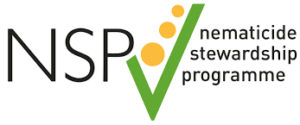The Nematicide Stewardship Programme (NSP) is a collaborative effort designed to promote the responsible use of nematicides, such as fosthiazate. It involves key stakeholders across the agricultural sector working together to ensure that these chemicals are used safely and effectively, minimising their environmental impact while maximising their benefits in controlling nematode populations.
Why is there an NSP?
The NSP was established in response to growing concerns about the environmental and health impacts of granular nematicide use.
Controlling nematodes is crucial for producing high-quality, nutritious potatoes, and granular nematicides play a key role within an integrated pest management (IPM) strategy.
The NSP’s mission is to promote best practices in every facet of granular nematicide use, encompassing handling operators, preparation and upkeep of machinery, application processes, and storage.
The group represents a collaborative effort across the industry, featuring members from Syngenta, AIC, FPSA, NFU, PPA, NIAB, Agrii, GB Potatoes, and various independent food organisations.
NSP best practice steps
As part of the Red Tractor standards for potato growers, the NSP best practice steps are designed to guide farmers towards safe and responsible application.
Here are the key steps of the NSP protocol:
Qualify
Before any granular nematicides are used, operators must be qualified. This means holding a PA4 of PA4G certification and completing the Nematicide Stewardship e-learning course. Membership in the National Register of Sprayer Operators (NRoSO) is also a must.
- Calibrate
Calibration is key to ensuring the effectiveness of nematicide application. Growers must ensure that the granule applicator is inspected and certified by NSTS every two years. Daily checks are also necessary to ensure everything from pipework to hopper lids are secure and functioning correctly. - Single pass
The application of granular nematicides should be efficient and precise. They must be applied and incorporated in a single pass, leaving no granules on the surface. This ensures that the treatment is as effective as possible. - Shut-off
A crucial component of safe and responsible nematicide application is the ability to shut off the granule flow accurately. Potato applicators must be fitted with a device that allows this action to be performed at least 3 metres before the end of the row, ensuring no excess application. - Spillages
In the event of a spillage, the NSP outlines clear guidelines to mitigate any potential environmental impact. Small spillages should be buried immediately, while larger ones should be carefully collected and stored until they can be returned to the manufacturer. - Field checks
Post application, it’s vital to monitor treated fields for any adverse effects on wildlife. Records of these checks should be made using the provided template on the Red Tractor website. Any issues should be reported immediately to the relevant authorities and the granule manufacturer.
The NSP is more than just a set of guidelines, it’s a commitment to the safe and responsible use of nematicides. By following these steps, growers are not only protecting their crops but also the environment and surrounding wildlife.

